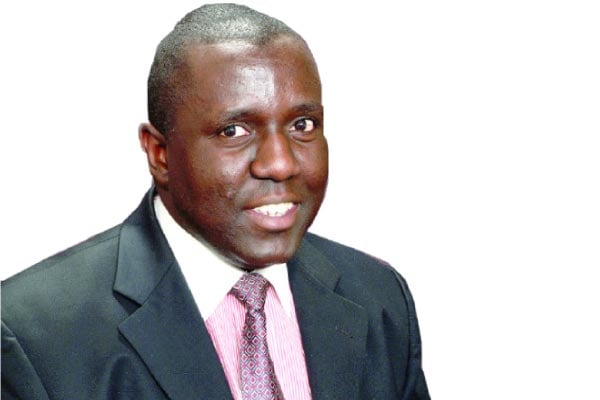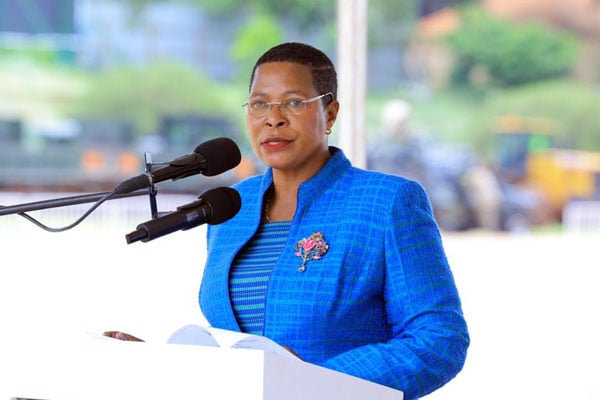Prime
A police guide to bodyguards

UPDF officers keep guard in Kyanja on May 2, 2023 after a soldier, Wilson Sabiiti shot and killed State Minister for Labour, Employment and Industrial Relations, Col (rtd) Charles Okello Engola from his home. PHOTO/ ISAAC KASAMANI
What you need to know:
- An investigation by the security services is underway to try and understand what could have prompted the soldier to shoot his boss.
- In Uganda, official bodyguards are trained by the regular army, Special Forces Command, police and private security organisations.
On Tuesday morning, shock engulfed the family, relatives and friends of Col (rtd) Charles Okello Engola, State Minister for Labour, Employment and Industrial Relations, after his bodyguard Pte Wilson Sabiiti shot him dead before taking his own life.
An investigation by the security services is underway to try and understand what could have prompted the soldier to shoot his boss.
The chairperson of the Uganda Private Security Association (TUPSA), Mr Grace Matsiko, defines a bodyguard as a professional person, who offers services of close protection to a principal (someone who is protected).
“Not every soldier qualifies to be a bodyguard. A bodyguard goes through unique extra training. For example, troops of the Uganda People’s Defence Forces are trained as soldiers. After that initial training, they have to be vetted and again retrained before being deployed as bodyguards,” he said.
In Uganda, official bodyguards are trained by the regular army, Special Forces Command, police and private security organisations.
Ms Hadijah Namutebi, the acting Chief Political Commissar in the Uganda Police Force, said police offers protection through its Very Important Persons Protection Unit and Vital Installation Security (VVPPU-VIS), all under the directorate of counterterrorism.
“VIPs are people, who by virtue of their status, their positions attract a security risk. The role of VIP protection is to provide day-to-day security and mitigate risks to ensure safety and security of the VIPs,” she said.
In cases of private persons, before a bodyguard is deployed, Mr Matsko said, the principal writes a request note to the force outlining clear reasons why they think they need such protection.
“Before any deployment is made, we always have what they call briefing and debriefing. You brief the person going for the duty then the person is also supposed to give the feedback,” he said.
The briefing should be on specific duties on what they are supposed to do, depending on the level of training they have received.
Ms Namutebi said police guards should always follow standard police code of conduct.
“They should ensure that they observe the required discipline by the Uganda Police Force. They must avoid acts that might compromise the security of their masters. When briefing them, we tell them to observe key things such as being smart, timely, having a clear programme from their principal and ensuring that their principal is always safe,” she said.
“Police guards should also collaborate with other police units and security agencies, desist from engaging in things that might bar them from protecting their principal,” she added.
Mr Tony Ssempijja, the principal founder of the umbrella, Uganda Bouncers Association, a body which brings together all bouncers, said they also offer close protection services.
“Our members are thoroughly trained before being deployed. We train them to be obedient, they are not supposed to beat clients. We ensure that they protect their masters at all cost and are not supposed to eat with the boss on the same table. Also, we tell them to be near the boss while he/she is in a meeting but keeping close monitoring on them,” he said.
For the principal, they are expected to be honest with their bodyguards.
“If you are an officer of government, you must also be clear on what you can provide. For example, you must state if you can provide accommodation to the guard and other issues like feeding. This will enable the deploying authority what is being provided and what is not,” Mr Ssempijja said.
He added that as a norm, the principal is supposed to be friendly, feed and accommodate the guard.
For police, Ms Namutebi said they expect the principals to first of all appreciate the bodyguard’s work, assess the level of threats against them, and take care of the welfare of the guards.
“These people are paid salaries but you are staying with them so you need to take care of their welfare seriously. Principals should not interfere with the deployment exercise and they are discouraged from handpicking,” she said, adding, “They should not give officers leave without notifying the deploying authority and in case they observe any bad behaviours in our officers, they should report immediately. They should also ensure that the residence and premises have some additional security measures such as CCTV cameras and fences,” she said.
In a telephone interview, Ms Rosemary Nyakikongoro, the chairperson of Parliament’s committee on Defence and Internal Affairs, believes that a poorly facilitated bodyguard is a danger to their master.




